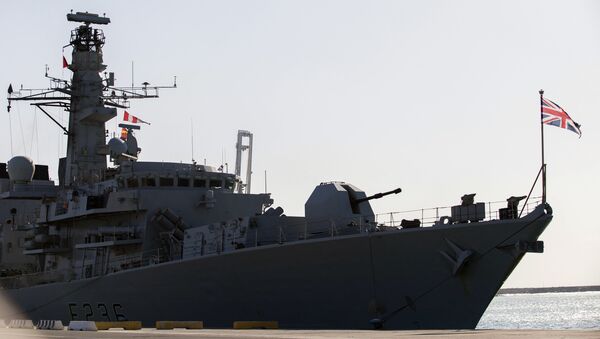In an interview with British broadcaster Sky News, chairman of the defence select committee Julian Lewis has sounded the alarm that the British Armed Forces are under-resourced financially which could possibly affect the country’s military capabilities.
"And that means we're incapable of putting together a range of options to defend ourselves, which is fine as long as there is no threat and is potentially disastrous if a conflict arises as most conflicts do - unexpectedly and unpredictably”, he said.
As the expert points out, the Royal Navy had to cut the number of destroyers and frigates just to afford two new aircraft carriers. According to him, the size of the British fleet is pathetic now.
"In order to allow for the carriers being provided for, it was agreed that we would reduce our frigates and destroyers from 35 ships to 32. It was never envisaged at the time of the aircraft carriers being conceived of, that we would go down to the present pathetic total of 13 frigates and six destroyers”, Lewis explained.
The defence analyst called on the newly-elected PM, Boris Johnson, to recognise the importance of defence and return to the levels of spending seen in the 1990s.
According to Sky News, the size of the British fleet has shrunk over the past three decades. Since 1982, the number of frigates has dropped from 43 to 13, while the number of destroyers has been cut in half, with the UK only possessing six now. There are also only 10 submarines instead of 16 that the Royal Navy used to have in the 1980s. Besides this, it still lacks an operational aircraft carrier because the HMS Queen Elizabeth is only carrying out sea trials now.
The broadcaster noted that even the current situation near the Strait of Hormuz backs Lewis’ stance on the impact of underfunding as only one frigate, HMS Montrose, has been sent there to protect British commercial ships after the incident with the UK-flagged oil tanker, seized by the Iranian military over allegations of breaching maritime rules. Although a Royal Navy destroyer is also expected to be sent there, their overlap will last only a few weeks as the frigate is due to head back for repairs.
Rear Admiral Alex Burton echoed Lewis’ stance and noted that it "would be ideal to have more warships accompany those (commercial) ships going through the Straits".
"It is unfortunate that successive defence reviews and successive budgetary constraints have both reduced the support programme for the Royal Navy and I would say for all three services”, he said, adding “that's what needs to be reversed”.
The rear admiral insisted that “lots of points of tension” around the world require deterrence and reassurance, while the Royal Navy is “thinly spread in meeting those commitments”, as he put it.
The UK frigate was assigned for the mission in the Gulf amid an escalation of tensions between Iran on one side and the US and its allies, the UK in particular, on the other side after an Iranian vessel was seized by the British Overseas Territory Gibraltar at the request of the US over suspicions of being involved in oil shipments to Syria in violation of EU sanctions.
Two weeks later, Iranian forces seized a British-flagged tanker with 23 crew members onboard in the Strait of Hormuz over alleged violations of international navigation norms.
In response, the UK vowed to escort its ships with the help of the maritime forces in the region and called on its allies to join and ensure the security of commercial navigation together. Several European countries are reportedly mulling to back the mission, as the UK earlier suggested. The US are launching a separate mission to accompany commercial vessels, however, inviting others to support it.




